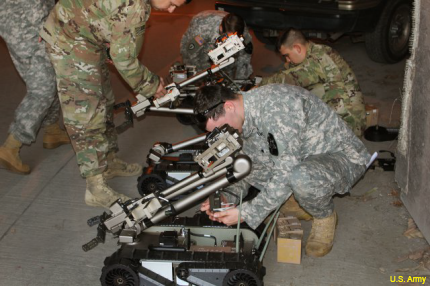Army fields robots for chem/bio/nuke detection
Researchers and contractor iRobot enhance the PackBot 510’s detection capability for use in South Korea.

Soldiers with the 23rd Chemical Battalion assemble their new PackBot 510's.
Army researchers are adapting a robot used for bomb-disposal and other tasks to enhance its ability to detect chemical, biological, radiological, nuclear or explosives threats.
The project, being carried out by several organizations working together, is developing a new variant of the PackBot 510, a ground robot made by iRobot that has been used widely in Iraq, Afghanistan and elsewhere.
"These robots are one-of-a-kind and filled a critical gap for soldiers on the front lines in Korea," Lt. Col. Mark Meeker, field assistance in science and technology advisor assigned to U.S. Forces Korea, said in a release. Specifically, the robots have been used to give the 2nd Infantry Division's 23rd Chemical Battalion a view in underground facilities, Meeker said.
Variations of the PackBot 510 have been in use since 2002, with more than5,000 of them having been delivered to military forces around the world. The man-portable, track-wheeled devices are designed to go into situations where it may be too dangerous to send a human, and have been used for bomb disposal, HazMat handling, surveillance and reconnaissance, and improvised explosive device detection.
They’ve also been capable of chemical, biological, radiological and nuclear, or CBRN, detection but a year-long effort by Army researchers and iRobot has improved that detection capability. The project was carried out by the Army Research, Development and Engineering Command, along with the Program Executive Office for Combat Support/Combat Service Support, and the Army’s Rapid Equipping Force.
"We leveraged an existing cooperative research and development agreement to integrate RDECOM's expertise with a contractor that builds robots," RDECOM science advisor James Koh said. "This opportunity is open to all comers and leverages the best of what industry has to offer."
Through the cooperative agreement, they also got the upgraded PackBots into service quickly. RDECOM's Tank Automotive Research, Development and Engineering Center built a prototype, and iRobot began exploring tunnel training areas in South Korea, the Army said. Following a technical demonstration, the Robot Logistics Support Center began building the robots within a month. The finished products arrived at Camp Stanley in South Korea in November 2015, and the 501st Chemical Company tested their capabilities.
"It is our job to get off-the-shelf technology into the hands of Soldiers as quickly as possible," Peter "Gregg" O'Neill, a representative of the Rapid Equipping Force, said.




